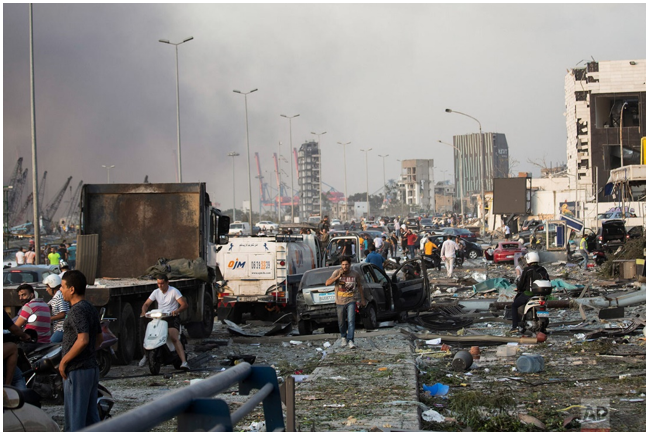Two months after the Beirut blast, symptoms of a pathological shock are worsening
Photo: Hassan Ammar/ AP
Report by Elia Nasrallah
After the 4th of August, the words "explosion, port disaster, Beirut does not die, victims, destruction, funerals, injured, transparent international investigation, corruption,…” are dominating the Lebanese scene and all Lebanese conversations. Moreover, pain and sadness are at a greater depth in the Lebanese hearts; and with every sun rise the effects of the hideous crime that hit the capital are revealed further.
Everyone is still under shock. Adults and young people are suffering from psychological symptoms and depression in addition to permanent health problems. How do people recuperate their wellbeing, how do they heal from such traumatic symptoms?
The Department of the Theological and Ecumenical Department in the Middle East Council of Churches took over the mission and announced its program to restore the human life of Beirut under the title "Trauma healing and spiritual counseling".
The First Scenes of panic
The explosion caused heartbreaking stories. Mira Nouimeh narrates her story of a day she thought was positive and fruitful before the catastrophe took place. After leaving a candy shop in the Achrafieh district, and while she approached her car, she heard a blast, which was followed moments later, by a second explosion which turned the area into ashes and smoke "shrapnel of glass scattered everywhere, I couldn’t understand what was happening". In a state of panic, Mira drove to St. George's Hospital where she was shocked by the scene, "blood covered injured, a bride with a beautiful blood-stained dress..." she continued as if she was "in a horror movie," she also pointed out, the sound of the glass that had covered the ground, which she still recalls until today. She went through a dark tunnel while repeating “I want to leave, I want to leave” at the time she didn’t realize that she meant to escape from the explosion square or from a land where its people are always promised disappointment and death.
Mira was weak, until she had carefully reached her home with a heavenly care. Some of the people around her considered that her experience was not harsh in comparison with people who lost their homes or were injured. However, Mira did not stop crying. She was not able to sleep without recalling all those painful memories, she even suffered from severe cramps in her hands, legs, and jaw.
Nouimeh participated in several group therapies, but she is still unable to overcome the hard moments and she remains unmoved in that place and that moment when the disaster hit.
Psychologist and Shock Therapy
In an interview with the specialist in clinical psychology and psychological treatment Zeina Zerbe, she pointed out that the Beirut explosion was an abrupt event that no one was prepared for psychologically; it is hard to face its consequences and its repercussions on the individual and psychological level. She added that the group trauma has several negative effects, such as fear, anger, anxiety, insecurity, mistrust and confusion. Its results lead to a split in the psycho-social and environmental balance, on several levels. On the physical level in case of physical injury or disability... and psychological health when the individual is exposed to traumatic scenes such as seeing dead bodies, blood, remains, and injured... on an environment level, when the relationship is troubled with the place where violence has occurred and most importantly when citizens become homeless.
As for the methodology of post-traumatic interventions, Zerbe has shown that there are levels to cope with the fallout. At the collective, psychosocial and environmental level, the criminal and violent act must be recognized and condemned; bringing justice to the people and putting under trial those responsible for this agony. Bringing justice to the victims in addition to material and moral compensation for them and their families.... At the level of professional intervention and dealing with survivors, it is best to allow a safe space to express the suffering, the trauma, and the anxiety associated with the event, to avoid suffering alone. It is also possible to create Individual and collective support, as well as medical, psychological, and spiritual support spaces.
On another hand, several organizations are working on helping individuals who have been traumatized by the explosion, and to accompany them and follow up on their psychological conditions. The Middle East Council of Churches (MECC) implemented the program of "Trauma healing and spiritual guidance", organized by the Department of Theological Affairs and Ecumenical Relations, with the support of specialists from various fields.
A group of young people who suffered from the tragedy volunteered in the disaster relief operation, through associations and church movements. They were in direct contact with the victims and the injured, including those who were traumatized by the disaster and who faced difficult times. It is worth mentioning that the Middle East Council of churches (MECC) continues its work in aiding Beirut through the appeals that were launched after the explosion.
Two months after the explosion, wounded Beirut's scenes are still etched in the Lebanese memory. Beirut today holds people who have lost hope and who stand before the unknown. How long will the shock last? The Lebanese people need psychological, moral and even material support to restore their normal lives, their happiness and hope; will there be any responsible who will handle these issues?
Communication and Public Relations Department

